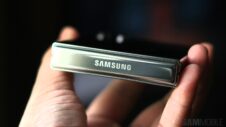The earnings estimate that Samsung released three weeks ago for the fourth quarter of last year showed that the company's 2019 full-year profit would decline a whopping 53 percent compared to 2018. That was confirmed today when Samsung published its full earnings report for Q4 2019 and the fiscal year 2019.
Samsung reported revenues of 230.40 trillion won ($193.7 billion) in 2019 compared to 243.77 trillion won ($221.6 billion) in 2018. Its operating profits for the year 2019 total 27.77 trillion won ($23.2 billion), a steep 53 percent decline compared to the 58.89 trillion on ($50.4 billion) in profit that it earned in 2018.
Total profit for 2019 is down 53 percent compared to 2018
Samsung's Q4 2019 earnings remained almost flat compared to Q4 2018 as the company posted revenues of 59.9 trillion won ($50.7 billion), just 1 percent above the same period last year. Its operating profit for Q4 2019 came in at 7.1 trillion won ($6 billion), a solid 34 percent slide compared to Q4 2018.
It became evident in the first quarter of 2019 that it would be a tough year for Samsung. The company went on to post its lowest quarterly profit in three years after a blockbuster 2018. Its revenues and profits took a hit largely due to the supply glut in the semiconductor market. Its NAND flash and DRAM products had made an insane amount of money in the year before. Prices fell sharply when supply outweighed demand and it has taken over a year for some stability to return to the market. However, it left a significant dent on Samsung's balance sheet.
The company highlights in its Q4 2019 earnings report that profit for the quarter fell because of the continued decline in memory chip prices as well as low demand for display panels. What helped this quarter were the solid sales of flagship smartphones and improved demand for memory chips meant for mobiles and servers.
Samsung's mobile business brought in higher quarterly earnings because of the strong sales of flagship Galaxy smartphones in the fourth quarter as well as improved profit margins on mass-market models like the Galaxy A series. Operating profit did fall compared to Q3 2019 because the effect from the Galaxy Note 10's launch had faded by then.
Samsung is cautiously optimistic about things improving in 2020. It continues to expect weak sales for memory chips, OLED panels and consumer electronics due to seasonality. Profit from the mobile business is expected to remain steady because new flagship and foldable models will be launched but it does caution that increased marketing costs will keep margins in check.
Conditions in the memory market are expected to improve gradually due to rising demand from data center companies and higher 5G smartphone adoption. It expects inventory to return to levels seen in previous years in the next few months which should result in prices recovering. Samsung will also be focusing on a transition to next-gen 1Z-nm DRAM and 6th Gen V-NAND chip production.








